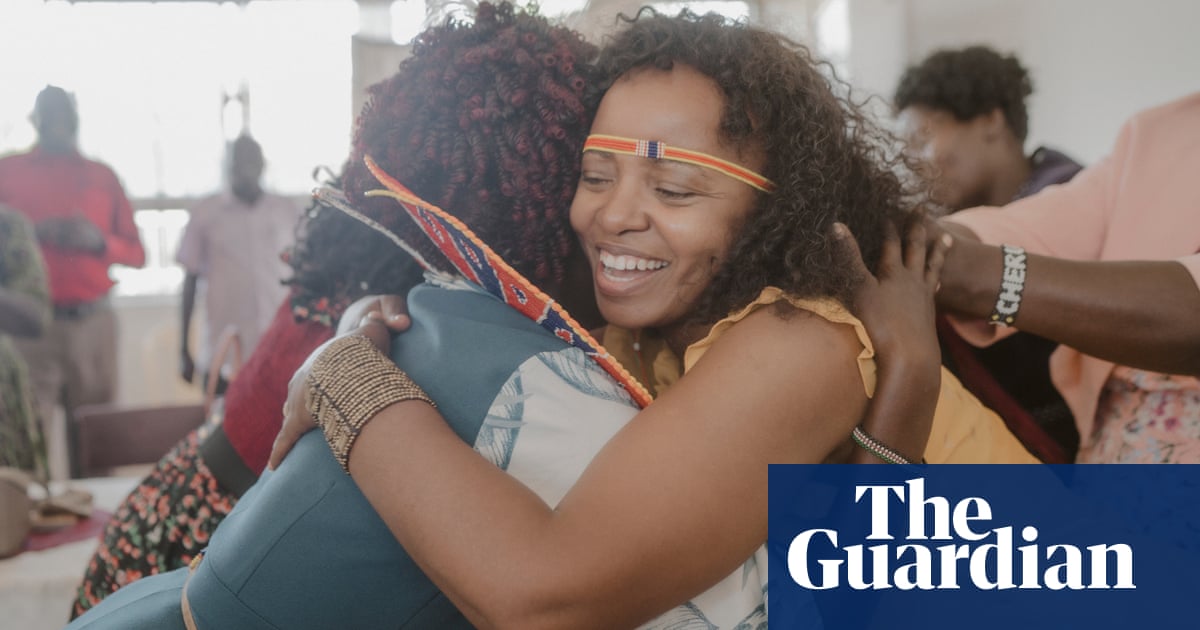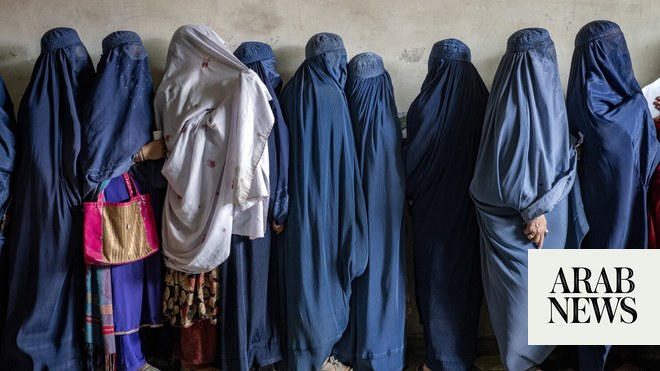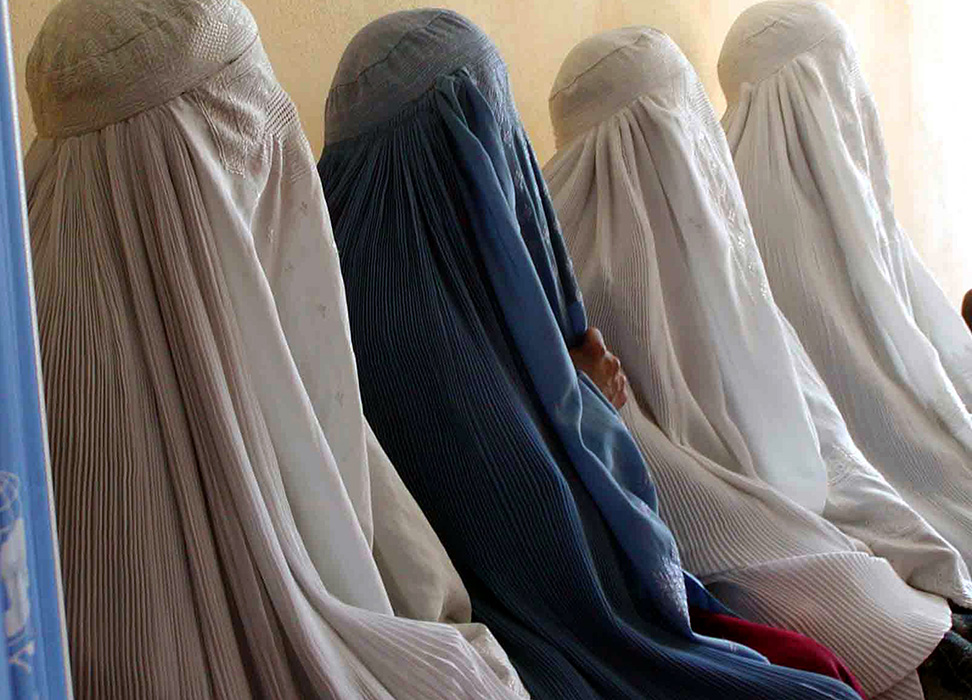
In a country where financial, health and welfare systems have collapsed, half the population are starving, there are four million drug addicts, and 20 percent suffer mental health problems, the Taliban are obsessed with one policy agenda — robbing women of any kind of purposeful existence.
Among the 80 decrees issued during the Taliban’s two years in power in Afghanistan, 54 are explicitly directed at women, with the objective of erasing their fundamental rights and liberties.
“Most of the girls from my class have had suicidal thoughts. We are all suffering from depression and anxiety. We have no hope.” These are the words of an Afghan girl in her early twenties who should have her entire life ahead of her, but who tried to take her own life after students were barred from attending university. A UN report found a surge in women who had attempted suicide, with teenage girls, prevented from pursuing education or careers, particularly vulnerable.
“Most of our patients lately are women; women"s rights activists, former government employees, journalists, and women who were actively employed under the previous Afghan government but who have now lost their jobs,” one mental health practitioner explained.
Given the extreme marginalization and discrimination women have traditionally faced, Afghanistan has the dubious distinction of being the only country where women have substantially higher suicide rates than men, representing upwards of 80 percent of cases. Domestic violence levels are among the highest in the world.
In one example of how women are treated like voiceless units of exchange, an estimated 10 percent of marriages result from a tribal custom in which a girl from a convicted criminal’s family is provided in compensation to the victim’s relatives, as a servant or a bride. Eighty percent of marriages occur without the consent of the bride, who frequently is a child.
In some provinces the Taliban has instructed schools to halt attendance for girls above Year 3, compared with the current standard of Year 6. This corresponds to the Taliban’s manifesto, which states that girls are mature adults from the age of 9.
The closure of beauty salons has erased one of the few safe spaces where women could socially come together, taking them one step closer to a nationwide life sentence of house arrest. The salons’ closure means another 60,000 women losing their incomes.
Yet Afghanistan does have one growth area: Supreme Leader Hibatullah Akhundzada has mandated 100,000 jobs for the madrassa sector, reallocating resources and staff away from mainstream education. Tens of millions of dollars have been spent on hundreds of new boys-only madrassas, with several million children to be enrolled. In remaining schools starved of funding which haven’t been converted into madrassas, modern subjects are replaced with Talibanized Islamic education.
The Taliban last month closed all 49 of Afghanistan’s teacher training centers. This is particularly disastrous, as more than half the staff in many education institutions have fled overseas.
“The depth and breadth of the changes made by the Taliban’s higher education authorities — and their profound and wide-ranging repercussions — point to a rapid and radical process of Talibanization, theocratization and instrumentalization of higher education,” one research paper warned. Foreign Policy magazine remarked: “An even bigger problem than the girls who can’t go to school are the boys who do,” and the “extremist curriculum is teaching children how to hate, not how to think.”
Although the Taliban are supposedly combating Daesh, such anti-education policies are a gift for extremist groups, nurturing a generation of men steeped in the most regressive and intolerant interpretations of Islam, with no other skills or economic prospects. Observers warn that the Taliban are turning a blind eye to the expansion of Al-Qaeda, the Pakistani TTP, and other like-minded entities, in explicit violation of the Taliban’s Doha Accord commitments. Meanwhile, freedom of speech and media protections are non-existent. Reporters sans Frontières this month warned that Afghanistan"s “media have been decimated.” Over 80 percent of female journalists lost their jobs over the past two years.
In Donald Trump"s ill-advised rush to withdraw US assets from Afghanistan, his Doha Accord gave the Taliban everything they wanted with no mechanism for holding them to account. Biden was subsequently warned about the consequences of allowing the Taliban’s return to power, but went ahead with his botched withdrawal anyway. After lip service that the Taliban would be held to account, the world is largely distracted by Ukraine and the Taliban have been allowed to proceed with the full extent of its gender apartheid policies. States such as Turkey, Pakistan, Russia, Iran, India and China are sidling towards de facto diplomatic recognition. China in particular has stepped up investment and engagement, seeing Afghanistan as a key plank in its Belt and Road strategy.
As with its promises under the Doha Accord, practically every Taliban public statement and commitment to the world has been a lie — starting with pledges to protect women’s rights, and finishing with rhetoric about preventing Afghanistan reemerging as a global jihad staging point.
The UN Security Council advocates an international “multipronged strategy” toward the Taliban. This would include ensuring full compliance with the Doha Accord; encouraging a greater role for centrist political and civil society actors – including women; and facilitating broad-based national dialogue. To promote human rights, combat corruption and enshrine the rule of law, international legal bodies should be given full jurisdiction.
The Taliban multiheaded hydra is as much at war with itself as the outside world. Just because Hibatullah’s regressive hardliners dictate policy today doesn’t mean that relative pragmatists won’t be pulling the strings tomorrow — particularly as it is obvious to all external and domestic observers that Afghanistan is a profoundly sick country in need of healing and rehabilitation, and no nation can thrive when the female component is oppressed and marginalized.
We can state with absolute certainty that women are Afghanistan’s future, with all their capabilities, energies and wisdom. Such a vision stands in stark contrast with the ignorant, regressive and extremist minds that Hibatullah’s madrassas seek to cultivate.
The only question is how much unnecessary misery, repression and deprivation the Taliban will subject this long-suffering nation to before acknowledging this inescapable fact.
• Baria Alamuddin is an award-winning journalist and broadcaster in the Middle East and the UK. She is editor of the Media Services Syndicate and has interviewed numerous heads of state.











